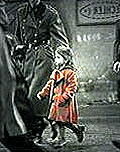 Born
December 18, 1946, in Cincinnati, Ohio, Spielberg attended California
State College (now California State University), where he received
a B.A. in English in 1970. His 24-minute short, Amblin, was
screened at the Atlanta Film Festival when Spielberg
was still in college; its success earned the 20-year-old a seven-year
contract with Universal-MCA as a television director. Born
December 18, 1946, in Cincinnati, Ohio, Spielberg attended California
State College (now California State University), where he received
a B.A. in English in 1970. His 24-minute short, Amblin, was
screened at the Atlanta Film Festival when Spielberg
was still in college; its success earned the 20-year-old a seven-year
contract with Universal-MCA as a television director.
After he had directed episodes of TV series such as
Columbo and Marcus Welby, M.D., Spielberg's first feature-length
TV movie, Duel (1971), earned the budding filmmaker critical
praise and a chance to jump to the big screen. He made his
feature film-directing debut in 1974 with The Sugarland
Express, a crime drama starring Goldie Hawn, for which
he also wrote the story. In 1975, Spielberg helmed the terrifying
film Jaws, about a great white shark who wreaks bloody
havoc in the seas around a New England beach town.
Spielberg followed up on the success of Jaws with Close Encounters
of the Third Kind (1977), a science-fiction drama that garnered
him his first Academy Award nomination for Best Director.
Though his next film, 1941 (1979), was a critical and commercial
disappointment, Spielberg roared back with the 1981 action
hit Raiders of the Lost Ark, which marked his first collaboration
with actor Harrison Ford (as the rugged hero Indiana Jones)
and producer George Lucas (whose seminal film Star Wars, also
featuring Ford, was released the same year). Raiders earned
Spielberg another Oscar nod for Best Director.
In the late 1980s, a string of relative disappointments,
including Empire of the Sun (1987), Always (1989), and Hook
(1991), coincided with a period of personal upheaval
for Spielberg. In 1989, he divorced his wife of four years,
the actress Amy Irving. Spielberg made a major career resurgence
in 1993 with the special effect-heavy dinosaur extravaganza
Jurassic Park.
 |
| Perhaps
the most moving image in Steven Spielberg's epic "Schindler's
List" is the little girl in the red coat, one of only
four color images in the three-hour black and white film.
|
Also in 1993, Spielberg released his sobering black-and-white
adaptation of Thomas Keneally's prize-winning novel Schindler's
List. The story of a complicated real-life hero, Nazi Party
member Oskar Schindler (played by Liam Neeson), Schindler's
List finally netted Spielberg the much-coveted Oscar
statuettes for Best Director and Best Picture. Nominated
in 12 categories in all, including acting nods for Neeson
and costar Ralph Fiennes, the film won a total of seven statues.
In 1994, Spielberg joined forces with Jeffrey Katzenberg,
the former head of production at Disney, and the recording
mogul David Geffen to form DreamWorks, a multimedia
entertainment company with interests in film, TV, music, computer
software, and the budding Internet technology. Though its
first several films were only modestly successful, DreamWorks
began to hit its stride in the late 1990s, turning out critically
acclaimed hits such as Spielberg's Saving Private Ryan (1998),
American Beauty (1999), Gladiator (2000), and the animated
feature Shrek (2001).
Spielberg had another banner filmmaking year in 1997, releasing
not only the mammoth sequel The Lost World: Jurassic
Park but also the drama Amistad. The latter film, a fact-based
drama about a revolt by African slaves aboard a Spanish slave
ship in 1839 that resulted in a memorable legal battle in
the United States, earned critical praise and a Golden Globe
nomination for Spielberg. The following summer, Spielberg
had an even greater success with Saving Private Ryan, starring
Tom Hanks. The grisly but awe-inspiring World War II epic,
nominated for 11 Oscars, earned Spielberg his second statue
for Best Director.
|
Screen: 放映(电影等)
episode :(电视等的)连续剧的一出(或一集)
debut:初次
star: 由...主演
wreak bloody havoc:造成血腥浩劫
Academy Award nomination:奥斯卡大奖提名
action hit:动作大片
collaboration:合作
upheaval:激变;剧变
resurgence:东山再起
extravaganza:大制作
sobering:严肃的
much-coveted:渴望已久的
statuette:小雕像,这里指奥斯卡奖
mogul:大人物;大腕
sequel:续集
|
